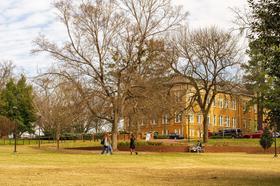Serving 457 students in grades Prekindergarten-5, Pinedale Elementary School ranks in the bottom 50% of all schools in Florida for overall test scores (math proficiency is bottom 50%, and reading proficiency is bottom 50%).
The percentage of students achieving proficiency in math is 35-39% (which is lower than the Florida state average of 52%). The percentage of students achieving proficiency in reading/language arts is 40-44% (which is lower than the Florida state average of 52%).
The student-teacher ratio of 17:1 is equal to the Florida state level of 17:1.
Minority enrollment is 84% of the student body (majority Black), which is higher than the Florida state average of 65% (majority Hispanic and Black).
Quick Facts (2026)
- School Type: Magnet School
- Grades: Prekindergarten-5
- Enrollment: 457 students
- Student-Teacher Ratio: 17:1
- Minority Enrollment: 84%
- Overall Testing Rank: Bottom 50% in FL
- Math Proficiency: 35-39% (Btm 50%)
- Reading Proficiency: 40-44% (Btm 50%)
- Science Proficiency: 40-49% (Btm 50%)
- Source: National Center for Education Statistics (NCES), FL Dept. of Education
Top Rankings
Pinedale Elementary School ranks among the top 20% of public schools in Florida for:
Category
Attribute
Percent Eligible For Free Lunch
School Overview
Pinedale Elementary School's student population of 457 students has grown by 26% over five school years.
The teacher population of 27 teachers has declined by 18% over five school years.
School Type
Grades Offered
Grades Prekindergarten-5
(No virtual instruction)
(No virtual instruction)
Total Students
457 students
Gender %
Total Classroom Teachers
27 teachers
School Rankings
Pinedale Elementary School ranks within the bottom 50% of all 3,662 schools in Florida (based off of combined math and reading proficiency testing data).
The diversity score of Pinedale Elementary School is 0.48, which is less than the diversity score at state average of 0.70. The school's diversity has stayed relatively flat over five school years.
Overall Testing Rank
#2602 out of 3662 schools
(Bottom 50%)
(Bottom 50%)
Math Test Scores (% Proficient)
35-39%
52%
Reading/Language Arts Test Scores (% Proficient)
40-44%
52%
Science Test Scores (% Proficient)
40-49%
52%
Student-Teacher Ratio
17:1
17:1
American Indian
n/a
n/a
Asian
1%
3%
Hispanic
8%
37%
Black
70%
21%
White
16%
35%
Hawaiian
n/a
n/a
Two or more races
5%
4%
All Ethnic Groups
Participates in the National School Lunch Program (NSLP)
Yes
Eligible for Free Lunch
77%
47%
Eligible for Reduced Lunch (20-21)
1%
4%
School Statewide Testing
School District Name
Source: National Center for Education Statistics (NCES), FL Dept. of Education
Profile last updated: 02/09/2025
Frequently Asked Questions
What is Pinedale Elementary School's ranking?
Pinedale Elementary School is ranked #2602 out of 3,662 schools, which ranks it among the bottom 50% of public schools in Florida.
What percent of students have achieved state testing proficiency in math and reading?
35-39% of students have achieved math proficiency (compared to the 52% FL state average), while 40-44% of students have achieved reading proficiency (compared to the 52% FL state average).
How many students attend Pinedale Elementary School?
457 students attend Pinedale Elementary School.
What is the racial composition of the student body?
70% of Pinedale Elementary School students are Black, 16% of students are White, 8% of students are Hispanic, 5% of students are Two or more races, and 1% of students are Asian.
What is the student-teacher ratio of Pinedale Elementary School?
Pinedale Elementary School has a student ration of 17:1, which is equal to the Florida state average of 17:1.
What grades does Pinedale Elementary School offer ?
Pinedale Elementary School offers enrollment in grades Prekindergarten-5 (No virtual instruction).
What school district is Pinedale Elementary School part of?
Pinedale Elementary School is part of Duval School District.
In what neighborhood is Pinedale Elementary School located?
Pinedale Elementary School is located in the Lackawanna neighborhood of Jacksonville, FL.
School Calendar
View the Pinedale Elementary School yearly calendar below. Note key dates such as:
Event
Date
Spring Break - Schools/Admin Offices Closed
March 16, 2026 (Monday)
Weather Day - Schools Closed
April 06, 2026 (Monday)
Last Day of School
May 28, 2026 (Thursday)
Weather Day - Schools Closed
May 29, 2026 (Friday)
Weather Day - Schools Closed
June 01, 2026 (Monday)
School Reviews
5 10/10/2025
Great school to work in.
Review Pinedale Elementary School. Reviews should be a few sentences in length. Please include any comments on:
- Quality of academic programs, teachers, and facilities
- Availability of music, art, sports and other extracurricular activities
Recent Articles

Zero Tolerance Policies in Public Schools Today
An updated look at zero tolerance policies in public schools, including current trends, costs, legal concerns, and what parents need to know now.

The Pros and Cons of Tracking in Schools Today
Explore the advantages and drawbacks of academic tracking in today’s public schools, including equity, outcomes, and what parents should consider.

Budgeting Hidden Costs of Public Schooling in 2026
Learn how families budget for school lunch, after-school care, and activities, the hidden costs of public schooling in 2026.





